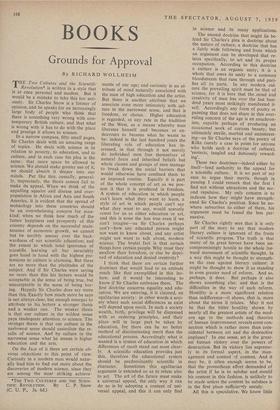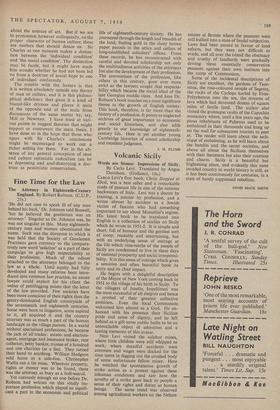BOOKS
Grounds for Approval
By RICHARD WOLLHEIM
THE Two Cultures and the Scientific . Revolution* is written in a style that is at once personal and modest. But it would be a mistake to take this too seri- ously. Sir Charles Snow is a former of opinion, and he speaks for an increasingly large body of people who think that there is something very wrong with con- temporary British culture, and that what is wrong with it has to do with the place and prestige it allows to science.
In a narrow compass, fifty small pages, Sir Charles deals with an amazing range of topics. He deals with science in its relation to poverty, to education, and to culture, and in each case his plea is the same: that more space be allowed to science. We should make greater use of it, we should absorb it deeper into our minds. Put like this, casually, general- ly, imprecisely, the thesis cannot fail to make its appeal. When we think of the appalling squalor and disease and over- population in Africa and Asia and South America, it is evident that the spread of technology into these countries should be an overwhelming concern for man- kind; when we think how much of the future happiness and prosperity of this country depends on the successful main- tenance of economic growth, we cannot but be terribly uneasy over the back- wardness of our scientific education; and the extent to which total ignorance of scientific learning all but invariably goes hand in hand with the highest pre- tensions to culture is alarming. But these are no more than the platitudes of the subject. And if Sir Charles were saying no more than this his lecture would be acceptable in the sense of being true, but unacceptable in the sense of being bor- ing. Happily Sir Charles does say more than this. Exactly how much more he says is not always clear, but enough emerges to attribute to his lecture a stronger thesis and a weaker one. The weaker thesis is that our culture in the wildest sense pays inadequate attention to science. The stronger thesis is that our culture in the nari-owest sense should assimilate the re- sults of science. And by culture in the narrowest sense what he means is higher education and the arts.
On the face of it there are certain ob- vious objections to this point of view. Curiosity in a modern man would natur- ally lead him to find out more about the discoveries of modern science, since they are among the most striking achieve-
*THE Two CULTURES AND THE SCIEN- TIFIC REVOLUTION. By C. P. Snow (C. U. P., 3s. 6d.)
ments of our age; and curiosity is an at- tribute of mind naturally associated with the man of high education and the artist. But there is another attribute that we associate even more intimately with cal- ture in the narrowest sense, and that is freedom, or choice. Higher education is regarded, at any rate in the tradition of the West, as a means whereby man liberates himself and becomes or en- deavours to become what he wants to be: indeed in the last hundred years the liberating role of education has in- creased, in that through it not merely do individual men free themselves of natural fears and inherited beliefs but whole classes and groups of men manage to break down the social barriers that would otherwise have confined them to an imposed routine. Equally it is part of the whole concept of art as we pos- sess it that it is produced in freedom. A system of education in which people can't learn what they want to learn, a style of art in which people can't say what they want to say, would scarcely count for us as either education or art, and this is none the less true even if we can't imagine—as Sir Charles perhaps can't—how any educated person might not want to know about, and any artist might not want to talk about, modern science. The brutal fact is that certain things bore certain people. Why must they swallow their boredom, or else be depri- ved of education and denied creativity?
I think that there are certain further doctrines that would lead to an attitude much like that exemplified in this lec- ture, and it would be interesting to know if Sir Charles embraces them. The first doctrine concerns equality and edu- cation. We are entering, it is claimed, an egalitarian society: in other words a soci- ety where such social differences as exist will depend upon merit. In such a society wealth, birth, privilege will be dispensed with as ordering principles, and their place will in large part be taken by education, for there can be no better method of discriminating merit than the educational process. Accordingly what is wanted is a system of education in which differences of merit stand out most clear- ly. A scientific education provides just this, therefore the educational system should be predominantly scientific in character. Sometimes this egalitarian argument is extended so as to relate also to art. The art of the future must make a universal appeal, the only way it can do so is by adopting a content of uni- versal appeal, and this it can only find in science and its many applications.
The second doctrine that might lie be- hind Sir Charles's plea is doctrine about the nature of culture, a doctrine that has a fairly wide following and from which an argument can be developed that re- lates specifically, to art and its proper occupation. According to this doctrine a culture is an organic unity; it is a whole that owes its unity to a common bloodstream that runs through and puri- fies all its parts. In any modern cul- ture the prevailing spirit must be that of science, for it is here that the mind and creativity of man has over the last hun- dred years most strikingly manifested it- self. Accordingly any form of poetry of painting that does not share in this over- ruling concern of the age is an anachron- ism, capable perhaps of producing an occasional work of curious beauty, but ultimately sterile, morbid and uninterest- ing—as Sir Charles says of the poetry of Rilke (surely a case in point for anyone who holds such a doctrine of culture), 'esoteric, tangled and dubiously reward- ing'.
These two doctrines—indeed either by itself—lend authority to the appeal for a scientific culture. It is no part of my case to argue their merits, though in passing I could remark that the first I find not without attractions and the sec- ond repulsive. My only concern is to indicate how they might have strength- ened Sir Charles's position. Since he no- where subscribes to. either of them, his argument must be found the less per- suasive.
Sir Charles rightly sees that it is only part of the story to say that modern literary culture is ignorant of the fruits of scientific progress. The truth is that many of its great heroes have been un- compromisingly hostile to the whole for- ward movement of scientific thought. In a way this might be thought to strength- en the case against literary culture: it might be thought to show it as standing in even greater need of reform. And so, perhaps, it does. But perhaps it also shows something else: and that is the difficulties in the way of such reform. Hostility is a more significant relation than indifference—it shows, that is, more about the terms it relates. May it not be that the bitter hostility shown by nearly all the greatest artists of the mod- ern age to the methods and theories of human improvement reveals some con- nection which is rather more than coin- cidental between art and the destructive impluses? In one sense, art is the great- est human victory over the powers of destruction. But its victory lies supreme- ly in its formal aspect, in the man- agement and control of content. And it may be, it often enough seems to be, that the promethean effort demanded of the artist if he is to subdue and mould his content in this fashion, is unlikely to be made unless the content he subdues is in the first place sufficiently unruly.
All this is speculative. We know little about the sources of art. But if we are to pronounce, however colloquially, on the proper character of human culture, these are matters that should detain us. Sir Charles at one moment makes a distinc- tion between the 'individual condition' and 'the social condition'. The distinction may be facile, but it might have made him wonder whether he had not been led on from a doctrine of social hope to one of individual conformity.
The trouble with the lecture is that it is written absolutely outside any theory of man or culture, and it is this philoso- phical deficiency that gives it a kind of biscuit-like dryness and places it quite at the opposite end of the scale from discussions of the same matter by, say, Mill or Newman. I have tried at vari- ous points to suggest theories that might support or controvert the main thesis. I have done so in the hope that those who agree with Sir Charles's conclusions might be encouraged to work out a richer setting for them. For in the ab- sence of any general conception of man and culture optimistic radicalism can be as depressing and soul-destroying a doc- trine as pessimistic conservatism.



























 Previous page
Previous page